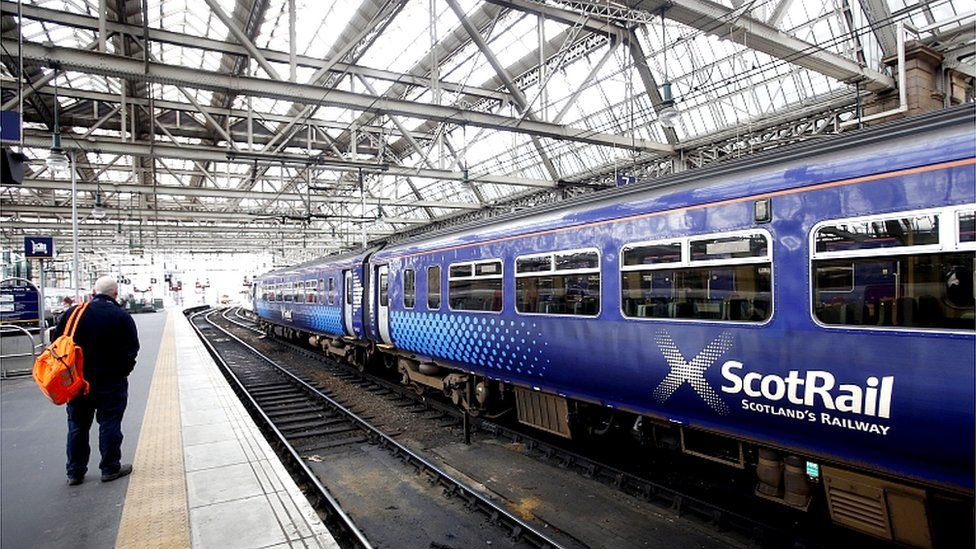ScotRail goes back into public ownership
- Published
- comments

ScotRail is back in public ownership for the first time in 25 years.
The train operator will now be run by a company owned by the Scottish government.
The previous operator, Abellio, had its franchise ended early amid criticism of the quality of the service.
The UK's rail network was privatised in the 90s by John Major's Conservative government. Before Abellio, ScotRail was run by National Express and First Group.
Passengers should not see any significant changes in services right away, but the Scottish government said it was a new beginning for the railways.
All ScotRail staff will transfer to the new Scottish government-owned entity, and the move has been welcomed by trade unions.
However, critics say Scotland's railways have just seen the biggest fare rise in a decade - and that some services now run less frequently than before the pandemic.
Speaking at Glasgow Queen Street Station, First Minister Nicola Sturgeon said bringing ScotRail into public ownership was a "historic and momentous occasion".
"Everyone involved has worked extremely hard to deliver the smooth transition of ScotRail into public control and ownership," she said.
"This new beginning creates a real opportunity to deliver a railway which is for the nation, and fully focused on being run for the benefit of its users - customers, staff and stakeholders, as opposed to shareholders."
But at First Minister's Questions in Holyrood on Thursday, Ms Sturgeon said the change in ownership would provide an "opportunity to modernise" and help "deliver passenger services which are efficient, sustainable, safe, fit for the future".
To help with that, she pledged staff and travellers would be able to take part in a "national conversation" which would "contribute to the future vision" for the service.
'CalMac on wheels'
Conservative transport spokesman Graham Simpson said issues with lifeline ferry services in Scotland showed that "the SNP is no good at running things".
With ferry operator CalMac still waiting for two new vessels, which are years late and overbudget, he said rail passengers should be worried that ScotRail would "turn out to be CalMac on wheels".
The SNP leader, however, insisted her party had already delivered significant improvements, citing several towns which have gained new rail links, with more to follow.
Dutch firm Abellio has been running the franchise since 2015, but had its contract ended early amid criticism over cancellations and performance levels.
The arrangement was made under powers which allow the Scottish government to take over the rail franchise without a bidding process.
Scotland's railways were temporarily nationalised in March 2020 to help the service cope with the impact of coronavirus.
Transport Minister Jenny Gilruth said Scotland's railways should be in the hands of the people of Scotland.
She said it was an "exciting opportunity to deliver a better railway service that best meets the needs of our passengers".
Kevin Lindsay, of the union Aslef, said it was a cause for celebration.
He said rail franchising was a "failed experiment", adding: "The railway should be for the people, by the people.
"We now have an opportunity moving forward to deliver a railway which delivers for the whole of Scotland."
'Fair pay increase' wanted
The RMT union, which campaigned for ScotRail to be taken into public ownership and is now calling on the Scottish government to nationalise Serco's Caledonian Sleeper service, is holding a "day of action" with a rally outside Queen's Street Station.
It wants rail services, ticket offices and jobs to be protected and expanded.
Mick Hogg, RMT's Scotland director, told BBC Radio's Good Morning Scotland programme his members welcomed the "symbolic" move as a "golden opportunity" to invest.
He said the transport minister seemed to be "ticking all the right boxes" and "does not want any industrial strife" following the strike action in 2021.
"We view our members as key essential workers," Mr Hogg said.
"Our members deserved medals during the height of pandemic and we don't think it is unreasonable for our members to receive a fair pay increase and certainly we will not be accepting our members coming under the public pay policy because we believe this is a direct attack on our collective bargaining agreement."
It would be up to members to decide whether to withdraw services again if that did not happen, he said.
To mark the nationalisation of the service, children will be able to travel free on Scotland's railways all weekend. Off peak return journeys normally cost £1 return for accompanied children under 16.
There is a certain symmetry to ScotRail's return to the public sector, on the 25th anniversary of the privatisation of the service.
The irony is not lost on unions and others who opposed the principle of rail privatisation.
The question is whether the return of ScotRail to the public sector will lead to eventual improvements to services.
Fundamental changes - for instance reopening or upgrading lines - are not the responsibility of the train operating company. These decisions are for the Scottish government and a separate company, Network Rail, which is responsible for the track.
For instance, the reopening of the Borders rail line - arguably the single most important change to services in 50 years - was driven principally by the Scottish government.
But some are hopeful that with all the main parties involved in running the railways now in the public sector, achieving change will be easier.
Some passengers though may have more immediate concerns.
Passenger numbers are still well below pre-pandemic levels which means there's currently less concern about overcrowding.
But some may wonder, for instance, when there will be trains every 15 minutes between Glasgow and Edinburgh again or be hopeful that fare rises in the future will be lower.
Meanwhile, politicians may find themselves drawn into rows on pay or rostering which were previously the responsibility of a private company.
Related Topics
- Published9 February 2022
- Published20 August 2021
- Published20 May 2021
- Published18 March 2021